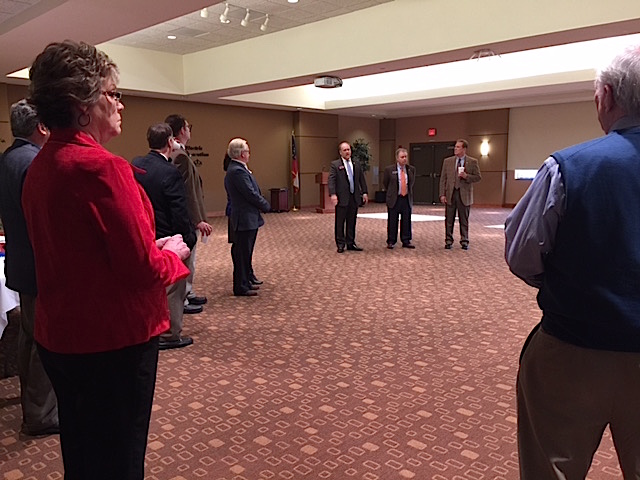
Transportation, medical marijuana, no knock warrants and stolen valor are just a few of the issues local lawmakers will tackle when they return to work under the Gold Dome in Atlanta on Monday. State Representatives Terry Rogers (R-Clarkesville), Dan Gasaway (R-Homer) and State Senator John Wilkinson (R-Toccoa) gave Habersham County constituents a glimpse into the upcoming 153rd General Assembly during a pre-legislative breakfast at the Habersham Electric Membership Corporation in Clarkesville on Tuesday.
About fifty people filtered in and out of the hour-long meet and greet session. Some came to ask questions, others, merely to listen. A recurring theme was the state of transportation in Georgia.
Transportation funding
“Transportation funding is going to be the most prominent debate we’re going to have,” says Gasaway. “Our federal government is not going to be playing the same role they’ve historically played in transportation in Georgia and we’ve got to pick up the slack or we’re not going to have the great road network that we currently have.”
A legislative study committee report issued in December warns Georgia will have to cover a $1 billion to $1.5 billion transportation funding gap to stay economically competitive. It will be up to the state legislature to figure out where the money will come from.
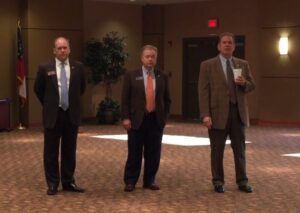
The committee’s 23-page report made no specific recommendations, but laid out several options for lawmakers on how to meet the state’s transportation needs. Options include increasing the state’s gas tax, creating a 1-cent statewide sales tax or investing in mass transit. Other options include moving approximately $180 million annually from the state’s general fund into transportation, indexing gas taxes to inflation or the cost of fuel, establishing an annual fee for alternative fuel vehicles and adding new toll lanes.
Rogers says it’s premature to talk about raising gas taxes in Georgia. “We’re going to examine all our options,” he says. “The House and Senate Transportation Committees will look at the Study Committee report then offer their best suggestion for funding. I know that, as a delegation, Senator Wilkinson, Representative Gasaway and I are watching closely to make certain that rural counties such as ours are not slighted, in favor of the more metro areas”
Gasaway points to the plan to build a billion dollar interchange in metro Atlanta as an example of the balance lawmakers must strike between funding urban and rural transportation improvements. “Obviously a billion dollars would go a long way in rural Georgia and it only handles one interchange in metro Atlanta.”
Wilkinson says he’ll keep a close eye on the process to insure “…that all the spending decisions are not made in Atlanta.” He wants the state to give local municipalities and county commissions flexibility in setting their own priorities for transportation projects.
Medical marijuana and cannabis oil
Another state-wide issue lawmakers will tackle is medical marijuana. State Senator Curt Thompson (D-Tucker) has introduced legislation to legalize it in Georgia. Another bill, HB1 introduced by Representative Allen Peake (R-Macon), deals strictly with medical cannabis oil. Cannabis oil is a derivative of marijuana but is non-hallucinogenic.
Both Wilkinson and Rogers support legalizing cannabis oil but are adamantly opposed to legalizing medical marijuana. “I do not support that whatsoever,” Rogers says. He voted for the cannabis oil bill last year and says if this year’s bill mirrors it he will vote for it again.

Rogers says he’s concerned about public confusion over the two bills and asserts they are mutually exclusive. “The HB1 bill will be very, very, very stringently regulated from the standpoint of quality control and security,” he says.
Wilkinson agrees the political waters have been muddied by having two marijuana related bills on the docket. “I’m supportive of the cannabis oil bill. I am adamantly opposed to the recreational use of marijuana.” Wilkinson concedes that allowing the use of any marijuana-based drug may be a slippery slope but adds, “It breaks my heart that some of our people in our district have had to uproot and go to other states just to get the help that their children need. For that reason I would support helping them with the medical cannabis bill.”
No knock warrants and conflicts of interest
Rogers and Gasaway have a few bills of their own that are sure to garner state-wide interest.
Gasaway, who’s entering his second 2-year term in office, wants to reform Georgia’s ‘no knock’ warrant policy. While he says the bill is not directly related to the May 28, 2014, ‘no knock’ drug raid in Cornelia that severely injured 18-month old Bounkham Phonesavanh (nicknamed Baby Bou Bou), that raid did bring the need for reform to the forefront. “What we found is there’s really nobody keeping tabs on how many of these warrants are even issued in the state,” Gasaway explains. “And, so, as a legislature we’d like to at least know what’s going on so that we can understand and make better policy.”
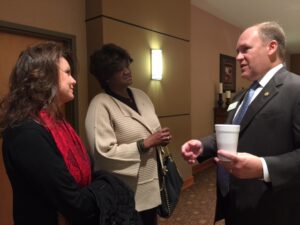
Another bill Rep. Gasaway plans to introduce also was borne out of recent Habersham history. It’s a bill dealing with conflicts of interests with county commissioners.
“We’ve had some problems in Dekalb County, Gwinnett County and here in Habersham County where specific votes have cost the taxpayers a lot of money. We’ve got to look at that,” Gasaway says. He’s referring to the questionable purchase of 30 acres of land off Highway 17 outside of Clarkesville in 2008 by the then Habersham County Commission. The president of the now defunct Community Bank & Trust, Charlie Miller, was a county commissioner at the time. His bank owned the note on the land. The land was bought for the purpose of building a new courthouse but could not be used because it sits outside city limits. Today, six years later, that 30-acre tract of land the county paid $1.1 million for still sits empty.
Economic development, stolen valor and organ donation
Rep. Rogers is entering his second full term after being elected in a special election to succeed former State Representative Rick Austin in 2011. He’s just been tapped to serve as one of Gov. Nathan Deal’s House floor leaders. While Rogers knows much of the focus will be on transportation this year he says attention should also be paid to economic development.
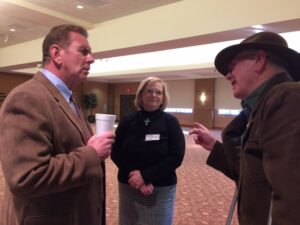
“We’ve just recently moved into the number one position as the number one state in the nation to do business. But when you’re number one people start shooting at you,” Rogers says. He lists deregulation, promoting entrepreneurship, tourism and recreation as ways to fortify the state’s business appeal. “We need to make certain that we continue to bring jobs into Georgia and make certain that the people of northeast Georgia have the opportunity to get those jobs.”
In addition to making a strong push for economic development, Rogers is pushing for two bills of his own. One would make it illegal in Georgia to profit from falsely identifying oneself as a veteran. Rogers’ Stolen Valor bill has strong bi-partisan support in the House. “It basically mirrors federal law and makes it a misdemeanor in the state of Georgia for you to profit off of trying to claim you’re a veteran or trying to claim a military award that doesn’t belong to you,” Rogers explains. “The Supreme Court ruled you can say those things all you want, it’s covered by freedom of speech, but it is against the law to profit from it.” For example, “If you walk into Lowe’s and tell them ‘I’m a veteran’ and take a ten percent discount and they find out that you aren’t a veteran then, guess what,” Rogers says, “you could be prosecuted. I think we owe it to our men and women in service to protect their integrity.”
Another bill Rogers dropped in the hopper aims to increase the state’s organ donor base. He says the bill was prompted by the recent death of Hannah Gabrels, a Habersham County woman who died while waiting on a lung transplant. “When the situation happened with Hannah we got to looking at the situation and realized there was a glitch in state law. People who go to the Driver’s License Department to get a state ID card can’t check off that they want to be an organ donor.” Rogers says about 157,000 Georgians were denied organ donor status because of the glitch. His bill would change that, giving those who apply for state IDs the same opportunity to become donors as those who get licenses.
Constituent input
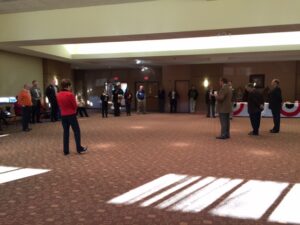
Tuesday’s pre-legislative breakfast was sponsored by the Habersham County Chamber of Commerce. A post-legislative breakfast will be held after the gavel falls on the forty-day session sometime in March.
Rogers, Gasaway and Wilkinson will spend much of the next three months in Atlanta but Rogers emphasizes they’re still available to listen to and help their constituents back here at home. “Even though we’re in Atlanta for, goodness sake, don’t hesitate to get in touch with us if you have a problem. We may not be able to solve your problem but we can work hard and we can find you an answer and, usually, we can cut through a lot of red tape.”
Contact information for the Habersham County delegation can be found on the Georgia House of Representatives and Georgia State Senate websites.
There’s no place like home
“I’m not looking forward to heading back to Atlanta,” Rogers says, “but I am looking forward to the legislative session. I think it’s going to be a good session. I think it’s going to be a challenging session.” He continues, “I will tell you this, on Friday afternoons the minute I hit the Habersham County line there’s a sense of peace and calmness that comes over me that just can’t be replicated.”







